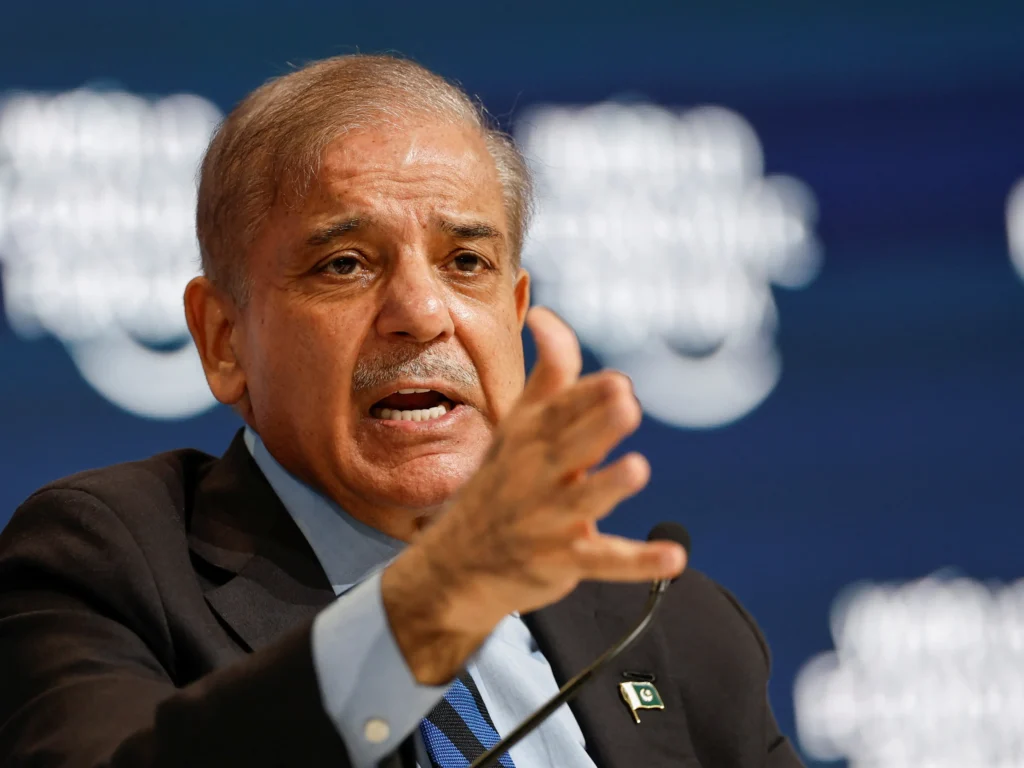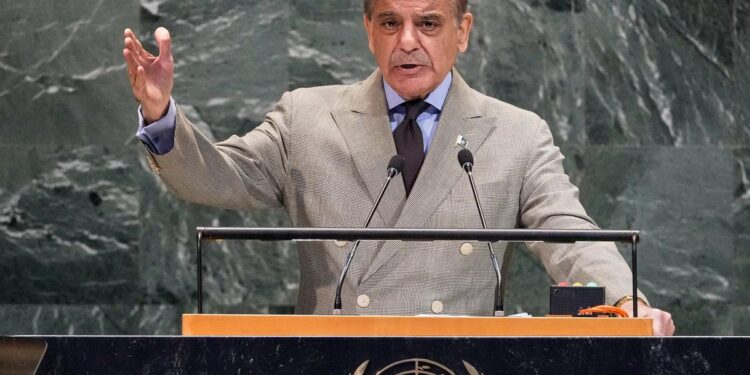Pakistani PM Shehbaz Sharif in his UNGA address appeals for direct talks with India, and praises Trump’s role in mediating the May ceasefire. Analysis & reaction.”

Sharif Appeals for India Talks at UNGA, Praises Trump’s Mediation Role
At the 80th session of the United Nations General Assembly, Pakistani Prime Minister Shehbaz Sharif issued a renewed call for direct dialogue with India, while also acknowledging the mediation efforts attributed to former U.S. President Donald Trump during the May 2025 conflict. His address drew sharp reactions from New Delhi even as Islamabad positions itself as open to comprehensive negotiations.
Key Highlights of the UNGA Address
In his speech before the international community, Sharif laid out several key thrusts:
- Readiness for talks: He affirmed that “Pakistan stands ready for a composite, comprehensive and result-oriented dialogue with India on all outstanding issues.
- Praise for Trump’s mediation: Sharif credited Trump’s intervention for averting escalation, calling his leadership “bold and visionary” and arguing that had mediation not come timely, the consequences would have been catastrophic.
- Framing of past conflict: He referred to the May hostilities, claiming India’s aggression and asserting that Pakistan “sent them back in humiliation, delivering a bloody nose.”
- Call for regional leadership: Sharif emphasized that South Asia needs proactive, not provocative leadership, implying that talks, not confrontation, must define the period ahead.
His tone balanced appeals for diplomacy with pointed reminders of past violence, thereby signaling both openness and firmness.
Context & Background — The May 2025 Conflict & Ceasefire
To understand the weight behind Sharif’s remarks, one must recall the May 2025 escalation between India and Pakistan. The crisis erupted when India launched strikes on alleged terrorist infrastructure inside Pakistan after an attack in Kashmir, prompting a series of counterattacks.
Amid mounting international concern, Trump’s team (including then-Secretary of State Marco Rubio and Vice President J.D. Vance) engaged in shuttle diplomacy. On May 10, both sides declared a ceasefire. While the ceasefire was fragile, it was billed as a U.S.-mediated de-escalation effort.
Pakistan, in particular, has since publicly lauded Trump’s involvement and has even suggested nominating him for a Nobel Peace Prize for his role.
However, India has been more reserved. New Delhi has insisted that Kashmir remains a bilateral matter and has dismissed any role for third-party mediation.
Thus Sharif’s appeal at the UNGA must be seen against this backdrop: Pakistan pushing for a renewed diplomatic opening, and India wary of external involvement.
International and Indian Reactions
Indian Response
India’s reaction was swift and uncompromising. The Indian government dismissed Sharif’s speech as “absurd theatrics”, asserting that no diplomatic flourish can mask the facts on the ground.
India reiterated that third-party mediation is not acceptable in disputes like Kashmir, which it insists must be resolved bilaterally.
Broader International Interest
Global observers have been watching the South Asia dynamics closely. Some analysts view Islamabad’s emphasis on dialogue as an attempt to shift from confrontation to diplomacy. Others see the praise of Trump’s role as part of Pakistan’s broader realignment strategy, seeking to engage the U.S. as a balancing power.
Meanwhile, countries like Saudi Arabia, Turkey, and Qatar had earlier been referenced in regional diplomacy around the conflict, giving additional diplomatic color to Sharif’s remarks. Wikipedia
Prospects & Challenges Ahead
Sharif’s UNGA appeal is bold, but its success hinges on several factors:
- India’s willingness to reciprocate — Unless New Delhi sees value in talks, Pakistan’s overtures may go unanswered or be rebuffed.
- Trust deficits and preconditions — Longstanding distrust, security concerns, and cross-border militancy will complicate any conversation.
- Role of external actors — While Pakistan welcomes third-party facilitation, India’s insistence on direct channels may constrain mediation initiatives.
- Domestic politics — In both countries, political narratives and national security postures could pressure governments away from concessions.
Nevertheless, Sharif’s address signals a diplomatic shift — from escalatory rhetoric to an attempt at engaging the international community and calling for dialogue.
Prime Minister Shehbaz Sharif’s appeal at the UNGA underscores Islamabad’s desire to reframe the India–Pakistan relationship through talks rather than conflict. By lauding Trump’s mediation role, Pakistan aims to assert a diplomatic narrative around the May ceasefire. Whether India or the broader global community respond in kind remains to be seen. As tensions persist, the delicate path between diplomacy and deterrence will define the coming months.
READ ALSO……Activist Sonam Wangchuk Arrested Amid Deadly Ladakh Protests: Statehood Turmoil Deepens 2025















 Categories
Categories









